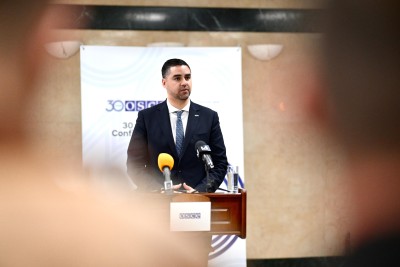OSCE Chair Ian Borg Concludes Diplomatic Tour Across Serbia, Kosovo, and Moldova
Ian Borg, the Chair-in-Office of the Organization for Security and Co-operation in Europe (OSCE) and Malta’s Minister for Foreign and European Affairs and Trade, recently wrapped up a series of diplomatic visits aimed at strengthening partnerships and advocating for continued dialogue and cooperation within the OSCE member states, focusing on Serbia, Kosovo, and Moldova.
 The OSCE Chair-in-Office, Maltese Foreign Minister Ian Borg, concluded his diplomatic tour in Moldova. / Picture: © OSC, ID 566650, (CC BY-ND 4.0)
The OSCE Chair-in-Office, Maltese Foreign Minister Ian Borg, concluded his diplomatic tour in Moldova. / Picture: © OSC, ID 566650, (CC BY-ND 4.0)
The OSCE plays a crucial role in the regions of Serbia, Kosovo, and Moldova, each of which is characterized by complex conflicts and challenges. The OSCE promotes peace and stability in areas of historical and active conflict, such as Kosovo and Transnistria. Its missions support direct dialog and negotiations to reduce tensions.
In states that are still in the process of democratic development, the OSCE supports the development of institutions and rule-of-law structures. This is fundamental to ensuring sustainable and stable governance. In these multi-ethnic and culturally diverse regions, the OSCE is actively working to protect the rights of minorities and combat discrimination. By promoting economic cooperation and sustainable projects, the OSCE contributes to improving living conditions and economic stability. This promotes social cohesion and internal security.
Reinforcing Commitments in Serbia
On April 10, 2024, Minister Borg concluded his official visit to Serbia, emphasizing the OSCE's robust dedication to enhancing regional stability and advancing crucial areas such as the rule of law, human rights, democratization, and media freedom. "Our collaboration with Serbia is a testament to the tangible results we can achieve together," Borg stated during his visit.
In Belgrade, Borg engaged in high-level discussions with key Serbian leaders, including President Aleksandar Vučić and First Deputy Prime Minister Ivica Dačić, focusing on implementing key reforms. His visit also featured a roundtable with media representatives, underscoring the critical role of independent media in democracies.
Fostering Dialogue in Kosovo
Continuing his regional engagements, Minister Borg visited Kosovo on April 12, 2024. His one-day tour in Prishtinë/Priština highlighted the OSCE’s key role in fostering dialogue and strengthening democratic institutions. Reflecting on 25 years of partnership, Borg commended the progress made in inter-municipal cooperation and youth engagement, particularly through initiatives like the OSCE Dialogue Academy for Young Women.
Meetings with Kosovo's top officials, including President Vjosa Osmani-Sadriu and Prime Minister Albin Kurti, centered on leveraging the OSCE’s support in ongoing reforms and the crucial Belgrade-Pristina dialogue. Borg’s visit underscored the significance of inclusive dialogue in building a unified, multi-ethnic society.
Commitment to Peace in Moldova
The diplomatic tour concluded in Moldova on April 13, 2024, where Minister Borg reaffirmed the OSCE’s commitment to the Transdniestrian Settlement Process. During his visit to Chisinau, he met with Moldovan leaders, including President Maia Sandu and Prime Minister Dorin Recean, to discuss enhancing the role of the OSCE in resolving conflicts and preventing escalation.
Borg stressed the importance of a peaceful, comprehensive settlement respecting Moldova’s sovereignty and territorial integrity, highlighting the ongoing efforts to facilitate confidence-building measures between Moldova and the Transdniestrian region.
Malta leads the OSCE
Malta, as the Chair of the OSCE, aims to increase its international visibility and strengthen its role as a mediator and peacemaker. Its primary objectives include promoting security and stability in the OSCE region, particularly in the Mediterranean, and strengthening human rights, democracy, and the rule of law. Malta also promotes regional cooperation, particularly in terms of economic development and political stability.
During the period of Russia's blockade, Malta can use its role as a mediator to restart talks and find solutions to deadlocked positions. It is crucial to uphold OSCE principles, such as cooperation, respect for human rights, and the promotion of democracy and the rule of law. Malta can propose strengthening the organizational structure and decision-making processes within the OSCE to make it more resilient to blockades by individual members.
Malta can also use its role to seek dialogue and promote a consensus within the OSCE, breaking the deadlock and ensuring the Organization's ability to act. Contributing to security and stability in Europe remains a primary objective of Malta, and it can support initiatives aimed at de-escalation and peace-building.
In these difficult times, Malta can strengthen its diplomatic position by actively contributing to finding solutions to the challenges facing the OSCE, representing not only its nation but also those of the OSCE member states as a whole. Minister Borg’s visits to Serbia, Kosovo, and Moldova underscore the OSCE's ongoing commitment to promoting security, peace, and stability in the region through dialogue and cooperation. These efforts reflect the organization's core mission to address and mitigate conflicts while fostering democratic values and human rights across its member states.



